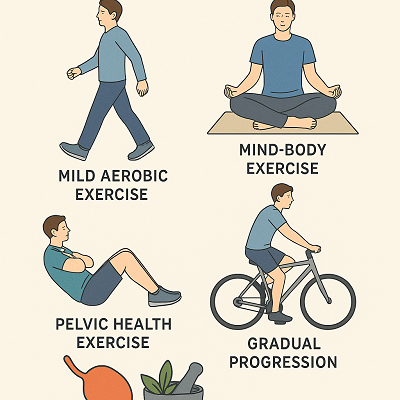4 Gentle Exercises for Epididymitis Recovery, Enhanced with Traditional Chinese Remedies
Epididymitis is a common issue affecting the male reproductive system. In Traditional Chinese Medicine (TCM), it's referred to as Zi Yong, or "testicular swelling." While seeking timely medical treatment is essential, the recovery phase shouldn't be overlooked. TCM holds that proper, gentle exercise can support healing—but it must be done the right way. Let's explore how exercise helps from a TCM viewpoint, which activities are most suitable, and how combining movement with herbal therapy can speed up recovery.

Why Exercise Matters in TCM for Epididymitis
In TCM, health depends on smooth circulation of Qi and blood, along with sufficient "vital energy" (Zheng Qi) to fend off disease. Epididymitis usually results from damp-heat accumulation and stagnation of Qi and blood in the lower body. Exercise plays a key role in correcting this imbalance:
Strengthens immunity: When Zheng Qi is strong, external pathogens have a harder time taking hold, helping inflammation resolve faster and reducing recurrence.
Improves circulation and metabolism: Better blood flow brings nutrients and immune factors to the inflamed epididymis while removing toxins and waste more efficiently.
Relieves tension and promotes Qi flow: Gentle exercises like walking, jogging, yoga, or tai chi help regulate the whole-body energy network, in line with TCM's idea that "where there is free flow, there is no pain."
4 Types of Gentle Exercise for the Recovery Phase
During recovery, choose low-impact activities that won't stress the epididymis. Here are four recommended types:
1. Mild Aerobic Exercise
Walking: An ideal low-impact activity. A 30-minute walk daily can improve blood flow, enhance immunity, and reduce emotional stress.
Slow Jogging: Helps strengthen heart and lungs, but avoid pushing too hard. Jog at a relaxed pace and stop before fatigue sets in.
2. Mind-Body Exercises
Yoga: Promotes flexibility and improves circulation through slow stretching and breath coordination. Great for whole-body balance.
Tai Chi: A calm, meditative practice that synchronizes breath and movement, relieving emotional stress and restoring inner balance.
3. Pelvic Health Exercises
Kegel (Pelvic Floor) Exercises: These strengthen pelvic muscles and boost local blood flow. Simply contract the anus for 2–3 seconds, then relax. Do 10–15 reps per set, 2–3 sets per day.
Gentle Sit-ups: Can enhance blood flow to the pelvic area—but perform slowly to avoid abdominal pressure that might strain the epididymis.
4. Gradual Progression Is Key
Start only after your doctor confirms you're ready. Begin with 15–20 minutes of walking or slow jogging. After one to two weeks, gradually increase to brisk walking or light cycling for 30 minutes. Stop immediately if you feel pain or discomfort and consult your doctor.
Exercise Works Best When Combined with Herbal Medicine
Exercise supports healing, but it's not a standalone cure. For effective recovery, especially in chronic or recurrent cases, TCM herbs play a crucial role.
TCM treatment follows the principle of syndrome differentiation, meaning herbal prescriptions must be tailored to the individual. Here are commonly used formulas:
Diuretic and Anti-inflammatory Pill: Contains over 50 herbs like Plantago seed, Dianthus, and Talcum. It fights infection, clears heat, reduces swelling, and improves circulation. It's effective for various types of chronic epididymitis.
Bazheng Powder (Ba Zheng San): Includes herbs like Plantago seed and Talcum, known for clearing heat and promoting urination. Especially helpful for urinary frequency and urgency caused by inflammation.
Juhé Pill (Juhé Wan): Combines peach kernel and mu xiang, used to relieve pain and soften nodules. Commonly used for testicular swelling and epididymitis.
Longdan Xiegan Decoction: Includes Alisma and Bupleurum, aimed at clearing liver fire and damp-heat. Helps reduce perineal and scrotal heaviness.
Xianfang Huoming Decoction: With Angelica dahurica, Saposhnikovia, and others, it clears heat, detoxifies, and eases swelling—suitable for acute, painful epididymitis.
Nuangan Decoction: Featuring Cinnamon bark and Lindera root, this warms and nourishes liver and kidneys and eases cold-type lower abdominal or testicular pain.
Lifestyle Tips for Better Results
While taking herbs and exercising, also:
- Avoid prolonged sitting to reduce pelvic pressure.
- Quit smoking and alcohol, which worsen damp-heat.
- Eat a light, clean diet to aid digestion and reduce internal heat.
- Don't ignore symptoms—untreated epididymitis can harden into nodules and even affect fertility.
In Summary
During epididymitis recovery, gentle and appropriate exercise helps strengthen the body and promote the circulation of Qi and blood. But exercise should be introduced gradually—avoid anything too intense. Most importantly, pair your workout with targeted herbal treatment and good lifestyle habits to speed up healing and prevent recurrence. Recovery isn't just about feeling better—it's about staying better for the long run.



